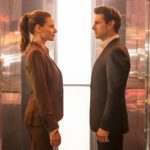Philadelphia Review
Posted on May 9, 2010 By John Gilpatrick 1990s, Movie Reviews
I went into “Philadelphia†knowing exactly what was going to happen and expecting it to be a manipulative courtroom drama – kind of like Kramer vs. Kramer. I was quite surprised, therefore, when I actually found it genuinely moving and honest. The three-dimensional characters and the bold way they confront the issues of homosexuality and AIDS made the film quite engrossing. I did find it a bit manipulative, but on the whole, I thought it was a very good film anchored by two extraordinary performances.
Andrew Beckett (Tom Hanks) has AIDS, but he doesn’t let it get in the way of what he loves. Andrew is one of the best lawyers in the city of Philadelphia and, as the film begins, his superiors put him in charge of one of the firm’s biggest cases ever. Shortly thereafter, however, Andrew is abruptly fired. The partners are vague about the reasons, blaming it on a misplaced document that Andrew actually had found in time. This leads him to suspect they found out about his illness, so he decides to take them to court. No one in the city wants to represent him, including Joe Miller (Denzel Washington), a homophobic lawyer. But Miller thinks it over. He hates seeing people discriminated against, and although he is repulsed by Andrew, he agrees to take the case.
The plot follows a predictable path. Andrew gets sicker but still finds the courage to appear in court. Joe admires Andrew’s courage and battles the perception that he too is a homosexual. Meanwhile, Andrew’s firm digs into his personal life, trying to discredit him and his ability as a lawyer. The only thing that’s really surprising and different is the support of Andrew’s family. In most films like this, the protagonist faces an uphill battle in private and in public. In “Philadelphia,†Andrew has all the support in the world from his family, as well as from his partner (played by Antonio Banderas).
Where this film excels is in its uncompromising look at AIDS and those affected by it. We see the lesions all over Andrew’s body. We see the way people look and act toward him, including Joe. And we see the devastated loved ones, who know their son, brother, friend, lover is going to die.
We are also treated to a thoughtful, probing examination of homosexuality in society. Joe goes after his opponents in court, asking many of them if they are homosexuals. The incredulous responses he gets say a lot about how we view homosexuality. Andrew is labeled from the beginning. Everyone else takes offense to simply being asked the question.
The film’s chief assets, however, are the two performances by its stars. Tom Hanks won his first Best Actor Oscar for his portrayal of Andrew. He does a phenomenal job. Andrew is obviously very sympathetic, but he’s more than just an AIDS victim. He’s made mistakes and done some foolish things, but he’s also very thoughtful. One of the film’s best scenes features Andrew discussing life and death with Joe over the sounds of the opera.
Washington wasn’t recognized by the Academy, not even with a nomination, despite arguably having a more difficult task. Joe shouldn’t be too sympathetic. He paints a damning portrait of homophobes in the courtroom despite being one himself. The scene in a pharmacy shows just how deep his disgust toward homosexuals goes. But he stands up for Andrew in the end, and the two form a solid friendship. The lengths he goes to in order to stand up for what is right is very admirable.
“Philadelphia†also features two phenomenal songs: one at the beginning and one at the end. The opening song won the Best Original Song Oscar in 1993 and is by Bruce Springsteen. The closing song, I think, is actually the better of the two. The aptly named “Philadelphia†is by Neil Young and will have many of you in tears as the credits roll.
Director Jonathan Demme should be proud of the film he made. “Philadelphia†is refreshingly honest and doesn’t sugarcoat much. It’s predictable but still quite powerful. And taking a chance on an actor like Hanks, who still hadn’t yet established himself as the jack-of-all-trades we think of him as today, was a stroke of genius. Those of you worried about sitting through an overly manipulative courtroom drama should give this film a chance. It just might surprise you the way it did me.
1993, 3.5 Stars, Antonio Banderas, Denzel Washington, Jason Robards, Jonathan Demme, Philadelphia, Roberta Maxwell, Tom Hanks
















